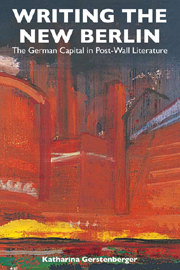Book contents
- Frontmatter
- Contents
- Acknowledgments
- Introduction: Newness and Its Discontents: Berlin Literature in the 1990s and Beyond
- 1 Erotic Sites: Sexual Topographies after the Wall
- 2 Bodies and Borders: The Monsters of Berlin
- 3 Multicultural Germans and Jews of Many Cultures: Imagining “Jewish Berlin”
- 4 Goodbye to East Berlin
- 5 Looking for Perspectives: The Construction at Potsdamer Platz
- Conclusion
- Bibliography
- Index
1 - Erotic Sites: Sexual Topographies after the Wall
Published online by Cambridge University Press: 05 February 2013
- Frontmatter
- Contents
- Acknowledgments
- Introduction: Newness and Its Discontents: Berlin Literature in the 1990s and Beyond
- 1 Erotic Sites: Sexual Topographies after the Wall
- 2 Bodies and Borders: The Monsters of Berlin
- 3 Multicultural Germans and Jews of Many Cultures: Imagining “Jewish Berlin”
- 4 Goodbye to East Berlin
- 5 Looking for Perspectives: The Construction at Potsdamer Platz
- Conclusion
- Bibliography
- Index
Summary
wenn man fickt, vermeint man doch was zu erleben, fremde räume bekommt man dabei zumindest zu sehen, andere wohnungen sozusagen, beinahe schon andere städte. daß sie so berlin kennengelernt hätte, würde sie nicht behaupten. und auch jetzt steht sie nicht wirklich vor neuen aussichten, sie tritt mehr so auf der stelle. immerhin auch diesmal ganz sony-trunken das gelände da draußen, sieht sie, ganz sony-frisch auch seine hände …
[when you fuck you think you are experiencing something, at least you get to see foreign rooms, other apartments so to speak, almost different cities. that she got to know Berlin this way she would not claim. and even now she is not really facing new prospects, rather, she is marking time. yet the terrain outside also this time completely sony-drunk, she sees, completely sony-fresh also his hands …]
— Kathrin Röggla, Irres WetterThe city as an erotic site has a long literary tradition. Historically, such plots range from the male traveler seeking erotic adventure in the foreign city to the single female professional hoping to find an appropriate companion in her home town. The particularities and the intent of erotic scenarios in city literature change over time, but they have in common that they first delineate and then push the boundaries of convention. The metropolis defines contemporaneity and is thus bound up with notions of change. Depictions of sex and sexuality are one way to measure and to analyze such changes for the reader as well as for the writer.
- Type
- Chapter
- Information
- Writing the New BerlinThe German Capital in Post-Wall Literature, pp. 24 - 51Publisher: Boydell & BrewerPrint publication year: 2008



